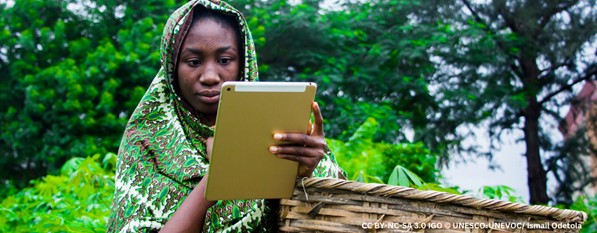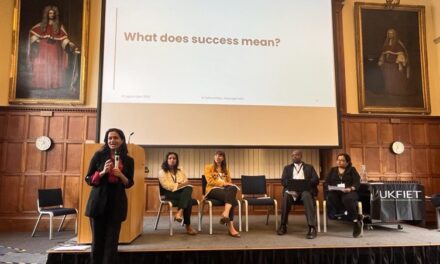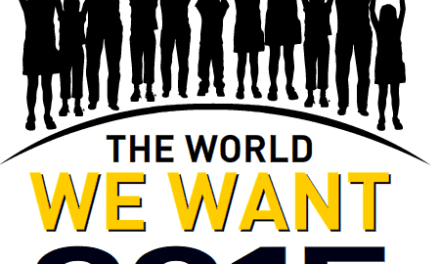This blog was written by Priscilla Gatonye, Programme Officer, UNESCO-UNEVOC and Nickola Browne, Associate Communications Officer, UNESCO-UNEVOC. It is based on inputs from various speakers at a symposium during the September 2023 UKFIET conference.
Technical and vocational education and training (TVET) plays a vital role in enhancing labour market outcomes and facilitating social integration and mobility of marginalised groups, helping them transition from precarious livelihoods and employment situations to formal employment and decent work.
The 2020 Global Education Monitoring Report on inclusion noted that TVET is often considered inclusive because, in some countries, it tends to serve populations commonly excluded from mainstream education. However, vulnerable populations continue to face significant obstacles in accessing quality skills training. These barriers include instruction in non-mother tongue languages, low levels of foundation skills, restrictive fees, familial responsibilities and inadequate TVET institutions in rural areas. In addition, many TVET institutions are ill-equipped to provide pathways to further education, training or employment. This challenge is compounded by a lack of strategic partnerships between the formal, non-formal and informal sectors, and trainers and instructors with insufficient practical knowledge and experience in meeting the needs of marginalised groups.
UNESCO-UNEVOC works to expand the inclusiveness of TVET institutions through comprehensive programmes, practical resources and knowledge-sharing activities aimed at improving the quality and accessibility of skills training. A 2019 UNESCO-UNEVOC report on inclusive TVET highlighted the need to support educators to operate in inclusive environments and the importance of partnerships between governments, associations, employers, parents, students and all members of society in the process towards inclusion.
At the recent UKFIET Conference on “Education for social and environmental justice: diversity, sustainability, responsibility”, UNESCO-UNEVOC hosted a symposium featuring insights from institutions within its UNEVOC Network and the United Nations University.
The symposium presented diverse perspectives based on empirical research, theoretical and conceptual pieces, and lessons learned from practice and programming. The discussion encompassed interconnected topics, such as innovative approaches to enhance inclusion, shifting paradigms in inclusive TVET delivery, gender equality, climate justice, removing the barriers to education for refugees, migrants and displaced persons, as well as the social inclusion of individuals from disadvantaged groups.
An overarching question during the symposium was: What are the characteristics of an inclusive TVET institution in a just education system?
In response, Priscilla Gatonye, Programme Officer at UNESCO-UNEVOC, introduced an operational framework highlighting that inclusive TVET institutions share a commitment to four fundamental principles: overcoming barriers to skills development; accommodating diverse learning styles and support systems; establishing collaboration and partnerships; and providing skills development opportunities for decent work. Ms Gatonye emphasised that inclusion is a process and presented the outline of a practical guide on “Piloting new approaches and modalities for more inclusive TVET”.
The guide maps the transition from the “what” to the “how” and offers actionable steps to kickstart inclusive practices through a ‘pilot approach’, while considering diverse learner journeys and acknowledging their experiences and challenges from application, enrollment, retention, success and labour market insertion.
Jay Deitchman, Director of Global Initiatives at Hudson Valley Community College, added that inclusive TVET is not only a process but a system characterised by intentional and innovative initiatives, designed to reach and positively impact those individuals and/or communities who are often under resourced, undervalued and underserved. He emphasised that these initiatives, whenever possible, should “meet students where they are,” and be developed with an awareness of and focus on the comprehensive needs of students – providing “wrap-around” services, when possible, to facilitate student success.
Paolo Nardi, Executive Director at the European Forum for Vocational Education & Training (EfVET), provided a concrete example of an inclusive institution in his presentation on a European Centre of Vocational Excellence, under the Governance for Inclusive Vocational Excellence (GIVE) project. Mr Nardi described the scientific framework, followed by the structure of the products realised, which consisted of more than 50 practices and related training courses for trainers to foster authentic inclusion at didactical, managerial and governance levels in their TVET ecosystems.
The symposium also looked at the unique challenges faced by climate migrants and displaced persons in accessing continuity of learning and timely skills development. Jonghwi Park, Academic Programme Officer and Head of Innovation and Education at United Nations University Institute for the Advanced Study of Sustainability (UNU-IAS), shared the findings of a recent UNESCO and UNU-IAS publication. The report indicates that while climate disasters (e.g. flood, landslides, cyclones) increase the likelihood of secondary school dropouts, thereby leaving students without proper skills for decent jobs, slow onsets (e.g. sea level rise, droughts, salination) force people to move to another city, province or even another country, oftentimes requiring them to reskill and upskill in order to establish a livelihood in a new settlement. Ms Park urged governments and TVET sectors to “look into skills needs of these vulnerable populations and provide a targeted intervention for inclusive skills development opportunities”.
Natalie Ax, Project Officer for the Bridging Innovation and Learning in TVET (BILT) project at UNESCO-UNEVOC, reiterated the need to address the consequences and implications of migration on TVET, as summarised in the 2019 UNESCO-UNEVOC discussion paper on human migration and TVET. Ms Ax urged TVET practitioners to mitigate the causes of migration by incorporating economically, socially and environmentally relevant qualifications and competencies. Additionally, she underscored the need for language support to learners, as well as mental health provisions, career guidance and facilitation of work experience to support learners effectively.
The symposium concluded with a call to action for policymakers, TVET institutions and relevant stakeholders to reorient TVET policy towards equity, inclusion and sustainable development. UNESCO-UNEVOC is prepared to support these efforts by providing practical guidelines on shaping inclusive TVET institutions, set to be published in 2024.





